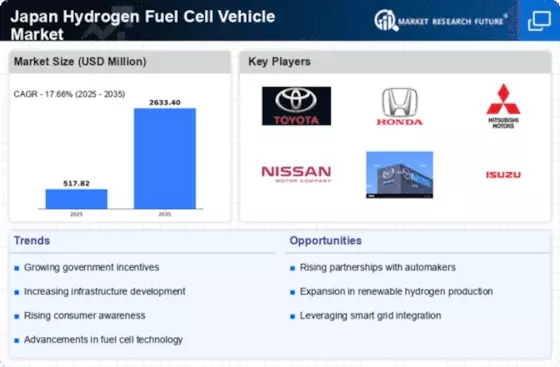The Japan Hydrogen Fuel Cell Vehicle Market is evolving rapidly, fueled by the increasing emphasis on sustainable transportation solutions and the shift towards reducing greenhouse gas emissions. The competitive landscape in this market is shaped by various global and local players actively pursuing innovations and strategic partnerships to leverage the growing demand for hydrogen-based vehicles. Companies are investing significantly in research and development to enhance fuel cell technology, improve vehicle performance, and address challenges related to infrastructure development, such as refueling stations.
The Japanese government has also been supporting the growth of this market through policy frameworks and incentives that encourage the adoption of hydrogen fuel cell technology, thus creating a conducive environment for competition among automotive manufacturers. Daimler has established a notable presence in the Japan Hydrogen Fuel Cell Vehicle Market through its advanced fuel cell technology and commitment to sustainability. The company's strength lies in its comprehensive research and development initiatives aimed at enhancing the efficiency and reliability of hydrogen fuel cells.
Daimler's strategy includes developing partnerships with local entities to work on infrastructure improvements that would facilitate the growth of hydrogen vehicles in Japan. Its brand reputation for quality and innovation, bolstered by a rich history in the automotive sector, gives Daimler a competitive edge in appealing to environmentally conscious consumers. Additionally, Daimler's focus on both passenger and commercial fuel cell vehicles broadens its market opportunities, enabling it to cater to varied segments within Japan. Volkswagen is a prominent player in the Japan Hydrogen Fuel Cell Vehicle Market, showcasing an impressive portfolio of vehicles designed for the hydrogen fuel segment.
The company's commitment to clean mobility is reflected in its ongoing projects and collaborations tailored to enhance hydrogen infrastructure in Japan. Volkswagen’s strength is underscored by its investment in RD for hydrogen fuel cell technology while also pursuing strategic mergers and acquisitions to fortify its market position. The company emphasizes building fuel cell technology not just for passenger cars but also for its commercial vehicle range, reflecting a versatile approach to meet market needs.
Volkswagen's strong global presence combined with its localized strategies enables it to navigate the complexities of the Japanese market effectively, making it a formidable competitor in the expanding hydrogen fuel cell vehicle landscape.


























Leave a Comment